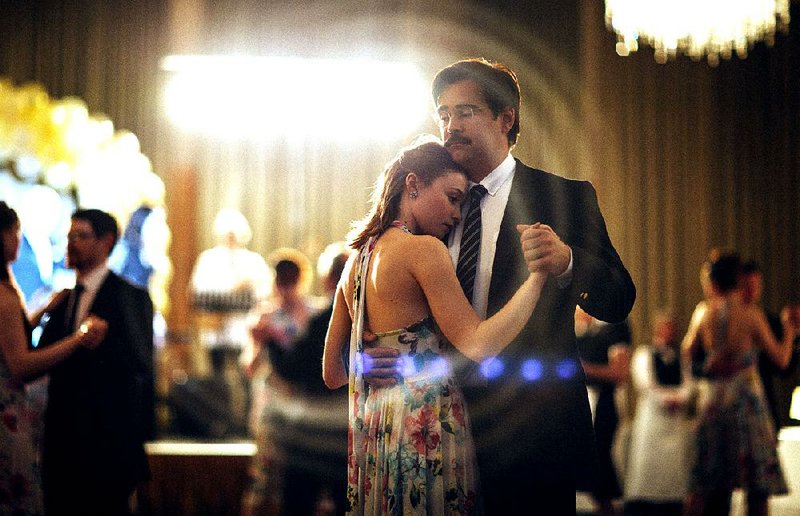I should have been a pair of ragged claws
Scuttling across the floors of silent seas.
The Lobster
90 Cast: Colin Farrell, Rachel Weisz, John C. Reilly, Ben Whishaw, Lea Seydoux, Olivia Colman, Aggeliki Papoulia, Jessica Barden, Michael Smiley
Director: Yorgos Lanthimos
Rating: R, for sexual content including dialogue, and some violence
Running time: 119 minutes
-- T.S. Eliot, "The Love Song of J. Alfred Prufrock"
In 2004 Gourmet magazine published an essay by David Foster Wallace called "Consider the Lobster." It upset a lot of the magazine's readers because it included a fairly detailed discussion of the lobster's sensory neurons and it worried the moral implications of boiling them alive -- and likely inflicting incredible pain -- merely for the epicurean delectation of upscale diners.
On the other hand, there are those who would point out that there is a significant emotional component to the sensation we identify as pain, and that a lobster might not qualify as a sufferer because, well, it's a lobster. It can't read Eliot or Shakespeare or write a power ballad. Its "feelings" can be read as reflexive contractions and instinctual flailings. A lobster is not us, and we needn't be concerned with how any individual creature is getting along.
In Greek filmmaker Yorgos Lanthimos' The Lobster, a puffy hangdog accountant named David (Colin Farrell) decides that if he can no longer be human, he will become a lobster. Because, he tells his brother Bob, who has been turned into a dog, "Lobsters can live for over 100 years, are blue-blooded like aristocrats, and stay fertile all their lives."
But if they're unlucky, the Limping Man (Ben Whishaw) tells him, they might be pulled from the ocean and boiled alive. And then at least David will know if they process pain or not.
As you can tell, The Lobster is not your run-of-the-mill cinematic experience. Even for Lanthimos, whose best-known film in this country is 2009's Dogtooth, in which he explored the implications of hermetic home schooling, the premise seems a little daft. But this is one absurdist allegory that seems more likely to engage than confound.
To try to say what it means might spoil some of the fun, but let's allow that this fable is set in a world very much like our own, where coupledom is the only acceptable mode of negotiating human society. Those who fail to pair up -- or those unable to recouple after losing a partner -- are required to report to the Hotel, where they are issued standard clothes and shoes -- there are no half-sizes available -- and presented with various structured opportunities to mingle with potential partners. (Gay or straight, it doesn't matter, but the bisexual option has been discontinued, presumably because some of the singletons were gaming the system, looking to double their chances of hooking up.)
And if, after 45 days, they haven't found a partner, they are transformed (surgically, not magically) into whatever animal they designate. According to Hotel manager (Olivia Colman from the ITV crime series Broadchurch), most people (like David's brother) choose dogs, which has led to canine overpopulation. She thinks David's choice is a fine one, since most people don't consider crustaceans when choosing an afterlife. (Human preference for the cute and cuddly has led to the endangerment of some species.) And should he fail to find a match, he shouldn't be too upset -- living as an animal provides a second chance at happiness.
Among the activities for the hotel's "guests" is a compulsory nightly hunt for rebels -- single people who resist the imperative to pair up. For every one they bag with their tranquilizer guns and drag back to the Hotel they earn another night. The best hunter, the Heartless Woman (Aggeliki Papoulia who starred in Dogtooth and Lanthimos' 2011 film Alps) has tacked more than 100 extra days onto her stay. If she keeps it up, she can continue to live as a human indefinitely.
David is not a good hunter, so he's determined to find a match. Because people are identified by one salient characteristic (John C. Reilly plays the Lisping Man, another poor hunter who's probably destined to become a parrot), the attempt to match the features of their potential partner stirs desperation. Whishaw's limping man proceeds to surreptitiously bash his face into things to simulate the spontaneous nosebleeds experienced by his objective (Jessica Barden). So David attempts -- and almost manages -- to echo Heartless Woman's coldbloodedness.
Then he escapes -- into the forest where the Loners dwell. There he meets the Shortsighted Woman (Rachel Weisz, who also narrates the film), and the group's fierce Leader (Lea Seydoux). Soon he has joined the resistance, posing as half of a married couple and conducting covert operations in the City. At the same time he's pushing back against the Loners' own Draconian codes.
Beautifully composed and assembled with preternatural confidence, The Lobster is filled with fine performances. (This is arguably Farrell's best performance, and certainly his most fun since In Bruges eight years ago.) The characters all speak in an earnest, deadpan tone that resonates with the formal regulations they're living under. We're cued in quickly that this isn't our familiar world; it's just a bit askance, drained of irony and subtext.
What's hard -- but important -- to convey is how funny this Franz-Kafka-meets-Charlie-Kaufman-in-Luis-Bunuel's-kitchen story is. While Lanthimos is obviously after bigger game than a black relationship comedy, every detail (even the most horrifying) in the movie contributes to what is becoming Lanthimos' signature tone of heartbreaking hilarity. Lobsters may or may not be able to process pain -- who can decide what you want based on your politics? -- but there's no doubt that anything that can laugh or love can also hurt. Who's to say we're better off?
MovieStyle on 06/10/2016
